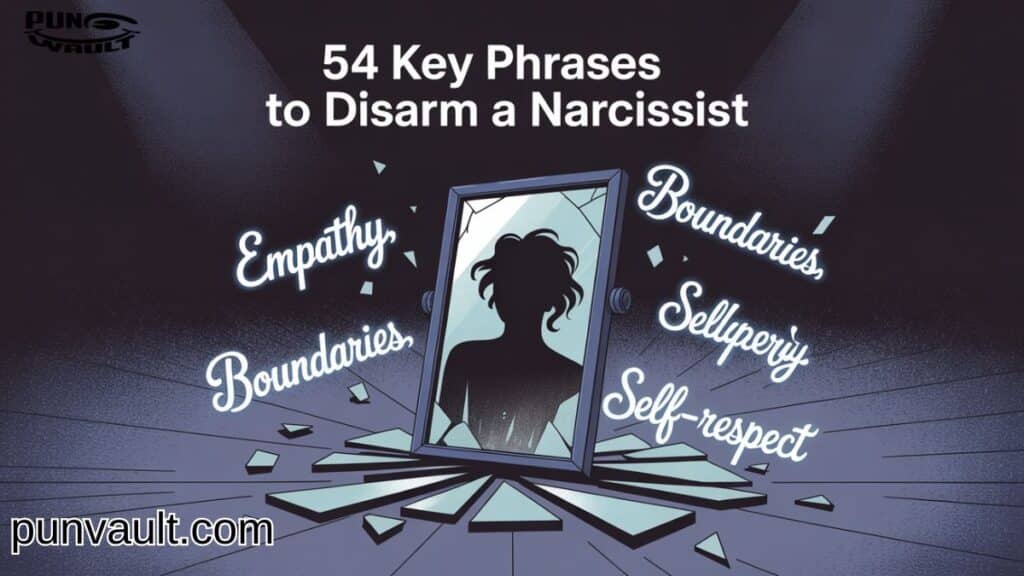54 Key Phrases to Disarm a Narcissist represents a strategic collection of carefully crafted verbal responses designed to neutralize manipulative behavior and protect your mental well-being during confrontational interactions. These battle-tested phrases serve as psychological shields against gaslighting, emotional manipulation, and verbal attacks commonly employed by individuals with narcissistic traits.
Your co-worker who takes credit for your ideas while publicly humiliating you. The family member who turns every conversation into a weapon against your self-worth. The partner who makes you question your own reality until you feel like you’re losing your mind. They all share one devastating commonality—they’ve mastered the art of psychological warfare, and you’ve been fighting with no ammunition.
These 54 key phrases to disarm a narcissist transform you from victim to victor in toxic encounters. Each phrase is strategically categorized for maximum impact: deflecting manipulation attempts, enforcing unbreachable boundaries, anchoring yourself to reality during gaslighting episodes, and shielding your emotions from calculated attacks. Master these verbal tools, and you’ll never walk away from another conversation feeling powerless, confused, or emotionally devastated.
Understanding the Psychology Behind Narcissistic Communication
How Narcissists Weaponize Words
Narcissistic traits create a perfect storm of manipulation tactics. They don’t just argue—they wage psychological warfare. Their goal isn’t resolution; it’s domination.
Gaslighting becomes their favorite weapon. They twist reality until you question your own memories. “That never happened.” “You’re being too sensitive.” “You always exaggerate.” Sound familiar?
Projection follows close behind. They accuse you of their own behaviors. The cheating spouse calls you untrustworthy. The lying colleague questions your honesty. It’s textbook narcissistic behavior.
Triangulation brings others into the conflict. “Everyone agrees with me.” “Your sister thinks you’re wrong too.” They manufacture allies to overwhelm your position.
Your Brain Under Attack
When facing narcissistic traits, your nervous system goes haywire. The amygdala hijacks rational thinking. Blood flows away from your prefrontal cortex—the area responsible for clear reasoning and articulate responses.
This explains why you freeze up or say exactly the wrong thing. Your brain literally can’t access its full potential during these encounters. It’s not weakness; it’s biology.
Emotional resilience requires understanding this neurological reality. The phrases you’ll learn work because they’re designed for your compromised mental state during conflict.
Research from Harvard Medical School shows that repeated exposure to narcissistic behavior actually changes brain structure. The hippocampus shrinks while the amygdala becomes hyperactive. You’re not imagining the lasting damage—it’s measurable.
The Strategic Framework: Three Core Approaches

The Gray Rock Method
Sometimes the best defense is becoming incredibly boring. Gray Rock means giving responses so dull that narcissists lose interest. They feed on drama, attention, and emotional reactions.
When they can’t get their narcissistic supply from you, they’ll eventually hunt elsewhere. It’s not cruel—it’s survival.
The Redirect Technique
Handling conversations with narcissists requires mental jujitsu. Use their energy against them by redirecting rather than resisting. When they attack, you pivot. When they escalate, you de-escalate.
This approach maintains your dignity while avoiding the trap of trying to win unwinnable arguments.
The Boundary Fortress
Assertiveness without aggression becomes your strongest weapon. Clear, firm boundaries delivered with calm confidence. No justification required. No negotiation allowed.
Your boundaries aren’t suggestions—they’re statements of fact about what you will and won’t accept.
54 Power Phrases That Actually Work
Deflection Arsenal: When They’re Baiting You
Handling conversations effectively starts with recognizing bait. Narcissists love dragging you into pointless arguments. These phrases deflect without engaging:
1. “That’s an interesting perspective.” Acknowledges without agreeing. Gives them attention without the argument they crave.
2. “I can see this matters to you.” Validates their emotion without accepting blame or entering debate.
3. “I’ll need to think about that.” Buys you time while appearing considerate. Ends immediate pressure.
4. “Thanks for sharing your thoughts.” Polite acknowledgment that signals conversation closure.
5. “I understand you feel strongly about this.” Recognizes intensity without taking responsibility for their emotions.
6. “That’s one way to look at it.” Implies multiple perspectives exist without confrontation.
7. “I appreciate you telling me.” Shows gratitude while maintaining emotional distance.
8. “I can see we have different views.” States obvious reality without judgment or blame.
9. “You’ve given me something to consider.” Appears thoughtful while avoiding immediate response.
10. “I hear what you’re saying.” Active listening without agreement or argument.
11. “That’s worth thinking about.” Delays response while appearing open-minded.
12. “I value your input on this.” Shows respect in communication without committing to action.
Boundary Enforcers: When They’re Crossing Lines
Control the situation by establishing non-negotiable limits. These phrases create unbreachable walls:
13. “That doesn’t work for me.” Simple, direct, final. No explanation needed.
14. “I’m not available for that.” Sets availability boundaries without justification.
15. “I’ve already made my decision.” Communicates finality. Prevents repeated requests.
16. “That’s not something I’m willing to discuss.” Creates topic boundaries. Protects sensitive areas.
17. “I need to end this conversation now.” Emergency exit phrase. Use when overwhelmed.
18. “My answer remains the same.” Reinforces previous decisions. Stops manipulation attempts.
19. “I’m not comfortable with that request.” Expressing your feelings while maintaining boundaries.
20. “That’s outside my boundaries.” Direct reference to limits. Educational for boundary-pushers.
21. “I won’t be changing my mind.” Absolute statement. Prevents continued pressure.
22. “This conversation is over.” Nuclear option. Use when all else fails.
23. “I’m stepping away from this discussion.” Physical and emotional withdrawal announcement.
24. “That’s not my responsibility.” Rejects inappropriate blame or duty assignment.
25. “I choose not to engage with this topic.” Personal choice assertion. Emphasizes autonomy.
26. “My decision is final.” Ultimate boundary statement. No room for negotiation.
Reality Anchors: When They’re Gaslighting

vain behavior often includes reality distortion. These phrases anchor you to truth:
27. “I remember it differently.” Gentle disagreement that maintains your version of events.
28. “That’s not what happened.” Direct contradiction when you’re certain of facts.
29. “I have a different recollection.” Formal way to disagree with their narrative.
30. “My experience was different.” Personal truth that can’t be argued.
31. “I trust my memory on this.” Confidence in your own recall. Powerful against gaslighting.
32. “That doesn’t match my understanding.” Intellectual disagreement without emotion.
33. “I experienced it another way.” Alternative perspective that’s equally valid.
34. “My perspective differs from yours.” Acknowledges multiple realities without conceding.
35. “I recall the facts differently.” Factual disagreement. Hard to argue against.
36. “That’s not accurate from my viewpoint.” Challenges their version while maintaining yours.
37. “I have a clear memory of what occurred.” Emphasizes certainty and clarity of recall.
38. “My version of events is different.” Story ownership. Your narrative matters too.
39. “I stand by what I experienced.” Unwavering commitment to your truth.
40. “That contradicts what I witnessed.” Strong disagreement based on personal observation.
Emotional Shields: When They’re Attacking Your Character
Toxic traits often manifest as personal attacks. These phrases protect your emotional well-being:
41. “I won’t accept being spoken to this way.” Sets communication standards. Demands basic respect in communication.
42. “Your behavior is unacceptable.” Direct feedback about their actions, not their character.
43. “I deserve to be treated with respect.” Fundamental human right assertion. Non-negotiable.
44. “This conversation has become inappropriate.” Identifies deteriorating dialogue. Signals need for change.
45. “I’m choosing not to absorb your anger.” Emotional resilience statement. Protects mental health.
46. “Your reaction seems disproportionate.” Observations about their response level. Often accurate.
47. “I won’t participate in character attacks.” Refuses to engage in personal destruction.
48. “This level of hostility isn’t warranted.” Comments on inappropriately aggressive responses.
49. “I’m not responsible for your emotions.” Crucial boundary about emotional ownership.
50. “Your feelings are valid, but your behavior isn’t.” Separates emotion from action. Important distinction.
51. “I won’t be your emotional punching bag.” Vivid metaphor that sets clear expectations.
52. “This interaction has become toxic.” Names the dynamic. Sometimes necessary reality check.
53. “I’m protecting my emotional well-being.” Self-care announcement. Justifies protective actions.
54. “I refuse to engage in this drama.” Identifies and rejects theatrical behaviors.
Advanced Tactical Applications
Timing Is Everything
Effective management of toxic encounters depends on precise timing. Deploy deflection phrases early, before emotions escalate. Save boundary enforcers for repeated violations. Use reality anchors immediately when gaslighting starts.
The 3-second rule saves relationships and sanity. Count to three before responding. This brief pause allows rational thinking to override emotional reactions.
Early warning signs include:
- Raised voice or aggressive tone
- Personal attacks instead of issue focus
- Historical grievances entering current discussions
- Absolutes like “always” and “never”
- Blame-shifting language
Tone and Delivery Secrets
Your voice carries more weight than your words. Assertiveness requires calm confidence, not aggressive volume. Lower pitch conveys authority. Slower pace suggests thoughtfulness.
Strategic silence often works better than perfect phrases. Let uncomfortable silences stretch. Many narcissists will fill the void, often revealing their true motivations.
Body language reinforces verbal boundaries. Stand tall, maintain eye contact, keep hands visible. Mirror their volume—if they’re loud, stay quiet. If they’re quiet, match their level.
Common Mistakes That Backfire
The empathy trap destroys good intentions. “I understand you’re hurt” often becomes “So you agree I have the right to hurt you back.” Narcissists weaponize your compassion.
Over-explaining provides ammunition. “I can’t do that because…” gives them reasons to argue against. Simple “no” works better than detailed justifications.
JADE kills effectiveness:
- Justify
- Argue
- Defend
- Explain
Avoid all four. They create opportunities for manipulation and control.
Emergency Protocols
When They Escalate Despite Your Best Efforts
Finding a solution sometimes means accepting there isn’t one. Not every conflict resolves. Some conversations need immediate termination.
Physical safety trumps everything. If threats emerge—verbal or physical—leave immediately. Trust your instincts. Situational awareness keeps you alive.
Exit strategies require preparation:
- Know your route out
- Keep keys and phone accessible
- Have a safe location identified
- Alert trusted contacts about volatile situations
Protecting Others in the Crossfire
Workplace applications demand special care. Document everything. Use email to confirm verbal agreements. Keep interactions professional and witnessed when possible.
Child protection requires different approaches. Model healthy boundaries for them. Don’t expect children to use these phrases—they need adult protection, not combat training.
Social situations with witnesses offer advantages. Narcissists often control their behavior with audiences. Use this strategically.
Recovery and Self-Care Strategies
Decompression After Difficult Encounters
Emotional resilience requires active recovery. Post-conflict exhaustion is normal. Your nervous system needs time to reset.
Proven recovery techniques:
- Deep breathing exercises (4-7-8 pattern)
- Physical movement to discharge stress hormones
- Journaling to process experiences
- Grounding exercises using five senses
- Professional therapy when needed
Avoid speculation about their motivations. Focus on your responses and recovery instead.
Long-term Relationship Strategies
Mutual understanding may never happen with true narcissists. Accept this reality early. You can’t logic someone out of positions they didn’t logic themselves into.
Respect each other becomes one-sided with narcissists. You maintain your standards regardless of their behavior. This protects your integrity and mental health.
No-contact sometimes becomes necessary. When every interaction damages your wellbeing, distance becomes self-preservation. This isn’t failure—it’s wisdom.
Building Your Defense System
Practice Schedule for Maximum Impact
Key phrases require muscle memory. Practice during calm moments, not crisis situations. Role-play with trusted friends. Record yourself to hear how you sound.
Weekly training plan:
- Monday: Deflection phrases (15 minutes)
- Wednesday: Boundary enforcement (15 minutes)
- Friday: Reality anchors (15 minutes)
- Sunday: Emotional shields (15 minutes)
Implementation Strategy
Start with one category. Master deflection phrases first—they’re safest for beginners. Add new categories as confidence grows.
Document patterns in their behavior. Which phrases work best with specific tactics? What triggers their worst responses? Knowledge becomes power.
The Transformation Promise
These 54 key phrases to disarm a narcissist represent more than verbal tools. They’re your pathway to reclaimed power, restored confidence, and protected peace of mind.
Handling conversations with difficult people becomes manageable when you have the right arsenal. No more replay loops of failed interactions. No more wishing you’d said something different.
Your emotional resilience grows with each successful application. Confidence builds through competence. Soon, their tactics lose power over you entirely.
Control the situation by controlling your responses. You can’t change them, but you can change your reactions. This shifts the entire dynamic.
Remember: you’re not trying to win arguments with narcissists. You’re protecting yourself while maintaining your dignity. That’s victory enough.
The person who walks away with their sanity intact has already won. These phrases ensure you’re that person—every single time.
Start today. Pick three phrases that resonate most strongly. Practice them until they feel natural. Your future self will thank you for this investment in your mental health and emotional freedom.
Effective management of vain relationships begins with these tools. Master them, and you’ll never feel powerless again.
Conclusion
These 54 Key Phrases to Disarm a Narcissist give you the power to transform toxic encounters forever. No more sleepless nights replaying conversations. No more questioning your sanity after verbal attacks. You now have proven tools that protect your mental health while maintaining your dignity. Start with just three phrases that feel most natural to you. Practice them during calm moments until they become automatic responses.
The 54 Key Phrases to Disarm a Narcissist represent your pathway to emotional freedom and restored confidence. You can’t change their behavior, but you can completely control your responses. That shift changes everything. These aren’t just words—they’re your shield against manipulation and your sword for self-protection. Master these phrases, and you’ll never feel powerless in toxic relationships again.
FAQS
1. What are effective phrases to set boundaries with a narcissist?
Phrases like “That doesn’t work for me,” “I’m not willing to talk about that,” and “I need you to respect my feelings” clearly communicate your limits without escalating the situation.
2. How can I disengage from a conversation with a narcissist?
Statements such as “I’m ending this conversation,” “This isn’t constructive,” or “I’m stepping away from this situation” assertively end interactions without confrontation.
3. What phrases help maintain emotional detachment?
Using neutral responses like “That’s your opinion,” “I hear you,” or “I choose not to engage” helps you remain emotionally unresponsive, which is crucial when employing the Gray Rock Method.
4. How can I redirect a narcissist’s manipulative tactics?
Phrases such as “Let’s stick to the facts,” “Can we focus on finding a solution together?” or “I need some time to think about this” shift the conversation away from emotional manipulation to constructive dialogue.
5. What phrases can I use to assert my independence?
Statements like “I trust myself to make the best decision for me,” “I’m not changing my mind on this,” or “I have the right to make my own choices” reinforce your autonomy and reduce the narcissist’s influence.

Abdul Matloob is a wordsmith with a sharp eye for grammar and a playful love for puns. Blending linguistic precision with clever humor, he crafts content that delights language lovers and grammar geeks alike. Whether he’s breaking down the quirks of English grammar or delivering punchy puns that make readers groan and grin, Abdul Matloob turns language into both an art and a game.







